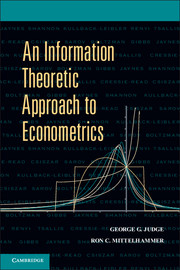Book contents
- Frontmatter
- Contents
- Preface
- One Econometric Information Recovery
- Part I Traditional Parametric and Semiparametric Econometric Models: Estimation and Inference
- Part II Formulation and Solution of Stochastic Inverse Problems
- Part III A Family of Minimum Discrepancy Estimators
- Part IV Binary–Discrete Choice Minimum Power Divergence (MPD) Measures
- Nine Family of MPD Distribution Functions for the Binary Response-Choice Model
- Ten Estimation and Inference for the Binary Response Model Based on the MPD Family of Distributions
- Part V Optimal Convex Divergence
- Abbreviations
- Index
- References
Ten - Estimation and Inference for the Binary Response Model Based on the MPD Family of Distributions
from Part IV - Binary–Discrete Choice Minimum Power Divergence (MPD) Measures
Published online by Cambridge University Press: 05 June 2012
- Frontmatter
- Contents
- Preface
- One Econometric Information Recovery
- Part I Traditional Parametric and Semiparametric Econometric Models: Estimation and Inference
- Part II Formulation and Solution of Stochastic Inverse Problems
- Part III A Family of Minimum Discrepancy Estimators
- Part IV Binary–Discrete Choice Minimum Power Divergence (MPD) Measures
- Nine Family of MPD Distribution Functions for the Binary Response-Choice Model
- Ten Estimation and Inference for the Binary Response Model Based on the MPD Family of Distributions
- Part V Optimal Convex Divergence
- Abbreviations
- Index
- References
Summary
Introduction
In this chapter, we use the family of minimum power divergence (MPD) distributions that was introduced in Chapter 9 and identify an associated new family of estimators for binary response-choice models based on the implied likelihood models. As discussed in Chapter 9, the large MPD class of distributions subsumes the conventional logit distribution and forms the basis for a very large set of parametric estimation alternatives. Finite sample properties of the MPD estimators, as well as empirical maximum likelihood (EML) estimators and an alternative nonlinear least squares estimator based on the MPD class of distributions (NLS-MPD), are demonstrated through extensive sampling experiments.
As noted in the previous chapter, the estimation and inference methods that have been traditionally used in empirical analyses of binary response converts the fundamentally ill-posed binary response model (BRM) stochastic inverse problem into a well-posed one that can be analyzed via conventional parametric statistical methods. In the past, this has often been accomplished by assuming that either a probit or logit cumulative distribution function (CDF) underlies the binary response and then applying maximum likelihood (ML) estimation and inference to a specific parametric statistical model. We noted in Chapter 9 the attendant negative statistical consequences that may result when the assumed statistical model is suspect.
Information
- Type
- Chapter
- Information
- An Information Theoretic Approach to Econometrics , pp. 187 - 204Publisher: Cambridge University PressPrint publication year: 2011
